I was delighted to launch my new book ‘Pedro Zamora, Sexuality, and AIDS Education: The Autobiographical Self, Activism and the Real World’ making a presentation at the GLBT Historical Society in San Francisco. This book is the product of study leave through Fusion funding, that I worked on a little while back. At the book launch, it was wonderful that despite its been over 22 years since Pedro was last in San Francisco (and he passed a away a few months later) that so many people came to the event, and were interested in his story, including some that knew Pedro personally. Also it was flattering that representatives from the AIDS Memorial Grove attended the event that have an academic scholarship in Pedro’s name, and that I was interviewed by two journalists, including Brian Bromberger who published this review in the Bay Area Reporter.
/ Full archive
The Springer Compact offset model: update on progress
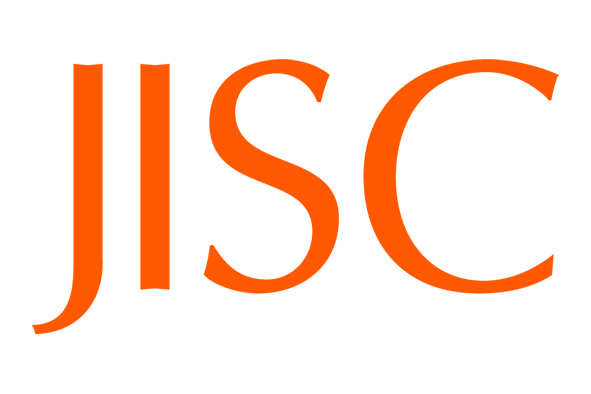
Original post by Mafalda Picarra, JISC – https://scholarlycommunications.jiscinvolve.org/wp/2016/07/06/the-springer-compact-offset-model-update-on-progress/
In this blog post, Jisc Collections provides an update on how the Springer Compact agreement is progressing in the UK.
In March 2015, Jisc Collections announced that it had reached an agreement with Springer for an offset model to contain the costs of publication and subscription access for UK institutions. Six months have passed since the agreement launched in January 2016, with an additional 368 articles published free of charge in the pilot phase between October and December 2015.
The Springer Compact agreement is a flipped model which enables researchers from 91 participating UK institutions to publish their articles immediately as open access in ~1,600 Springer journals as well as to access all content published in ~2,500 Springer journals. In this flipped model, rather than paying a subscription fee and an unknown number of APC charges, the institution pays a set fee for unlimited APCs based on their 2014 APC expenditure with Springer and a top up fee to cover access to all the subscription content – thus containing the total cost of ownership.
This model moves away from the traditional historical print spend model aiming to reduce costand administration barriers to hybrid open access publishing and to increase open access. All UK articles published in eligible Springer Open Choice hybrid journals are made immediately open access upon publication and are automatically compliant with funder requirements.
Since January, 1259 articles have been published by authors from 92% of UK institutions participating in the agreement (Figure 1). In only five months (January to May), 86% of UK institutions have already published open access articles equivalent to or in excess of their total 2014 APC spend. This means that researchers from these institutions are publishing more OA articles than they did in 2014 but the cost to the institutions is capped. If we look at the pro-rata (Jan-May) of the total fee paid to Springer for this year (2014 APC spend and subscription top up fee), 23% of these institutions have already published open access articles to value of the total combined fee.

Figure 1 Articles published by month.
In addition, the number of articles published on open access through Springer’s hybrid journals has increased by 25% in the first five months of the agreement when compared to the total number of articles published in 2015 (Figure 2).
 Figure 2 Articles published by UK authors in Springer hybrid journals in 2015 (subject to APC payment) and 2016 (under the Springer Compact deal).
Figure 2 Articles published by UK authors in Springer hybrid journals in 2015 (subject to APC payment) and 2016 (under the Springer Compact deal).The subject areas where more articles have been published include Medicine (22%), Biomedical and Life Sciences (18%), Education (9%), Earth and Environmental Science (7%), Chemistry and Materials Science (6.6%), Engineering (6.5%), and Mathematics and Statistics (5.8%) (Figure 3).

Figure 3 Articles published by subject.
Examples of journals with the highest number of publications include Diabetologia (26 articles), Social Psychiatry and Psychiatric Epidemiology (22 articles), Synthese (19 articles), Journal of Autism and Developmental Disorders (17 articles), Psychopharmacology (17 articles), and The International Journal of Advanced Manufacturing Technology (17 articles) (Figure 4).

Figure 4 Journals with the highest number of publications.
The feedback received from libraries at Jisc’s offsetting workshops[1] suggests that this is a workable and efficient model that other publishers could adopt. The administration has been easier for institutions, for instance, by rationalising the eligibility, approval and payment processes which consequently saves staff time. Institutions have reported that it is relatively easy to determine eligibility and that there is no need for authors to consider different application processes or funding routes. This model is also seen as beneficial for institutions given the fact that there are no fixed limits on the number of articles that authors can publish and authors are not required to use a code or a voucher to pay for APCs.
The Springer Compact agreement also helps researchers to comply with funders and institutions open access mandates. It does so by enabling compliance with the key requirements stated in various research funders open access policies: articles are made immediately available on open access (no embargo periods apply), articles are made openly available under CC BY licences, and a copy of the final peer-reviewed manuscripts will be deposited in repositories via Jisc’s Publications Router.
Paul Ayris, Director of UCL Library Services, said: “The Springer Compact deal is an excellent new model that enables UK authors to achieve Gold open access at no additional cost. As well as the significant financial benefits, it simplifies administration for authors and institutions, and streamlines the process of complying with funders’ open access policies. UCL wholeheartedly supports this model, and hopes to see other publishers following suit.”
Veronika Spinka, Open Access Manager, Springer Nature, added: “Springer Compact is a workable model that reduces the manual effort and workload for authors and institutions. Workflows provide a high-quality service level to accommodate all parties. Based on customer feedback, we continue to make our processes more efficient and reliable so that OA publishing becomes as easy as possible.”
By working with Springer and UK institutions to implement this model we continue to identify a number of areas where further improvements could be made. Some of these are about ensuring consistency in reporting (for example, by ensuring that research funders such as RCUK are acknowledged in the articles), others are about communications with authors and continuing to simplify the administration. We will continue to monitor and evaluate the effectiveness of this agreement over the year and to share findings and recommendations for best practice with institutions and publishers. We also hope that other publishers will be encouraged by our initial evaluation of the Springer Compact model and consider exploring similar flipped models.
Information on the articles published on open access can be consulted on the OpenAPC initiative website.
For more information on how you can make use of this agreement BU has with Springer, please refer to this blog post : http://blogs.bournemouth.ac.uk/research/2016/04/11/you-can-now-publish-open-access-for-free-with-springer-open-choice-journals/
[1] Jisc has been running a series of workshops on ‘Getting the most from open access offsetting deals’ to inform staff in higher education institutions about our negotiated deals to help reduce the costs of publishing open access articles. These workshops have been attended by more than 40 participants from higher education institutions. The next workshop will be held on 25 July 2016 (https://www.jisc.ac.uk/events/getting-the-most-from-open-access-offsetting-deals-25-jul-2016).
Why is Balance critical in Game Design?
We would like to invite you to a guest talk on Games research.
Title: Why is Balance critical in Game Design?
Speaker: Simon McCallum (Gjøvik University College, Norway)
Date: Friday 22nd July 2016
Time: 1:00PM-2:00PM
Room: Inspire LT, Fusion Building, Talbot Campus
Brief: In this presentation Simon will discuss the role of choice in games and how for meaningful choice to exist the options need to have carefully curated balance. Options that are too similar become meaningless, as does a single clearly better option. Creating interesting incomparables is part of the art of game design. We will also discuss other aspects of balance related to game resources, starting positions, unit power etc.
We hope to see you there.
How do you like your eggs?
We’ve acknowledged by now that you can boil an egg in 3 minutes (taste preferences dependent obviously), but the question on Tuesday 28 June 2016 was whether 6 current PGR students could successfully present their research in 3 minutes each. As part of the Festival of Learning, the Graduate School’s 3 Minute Presentation (3MP) event put PGRs to the test as they battled the bell, which warned them when they had 30 seconds of time remaining and stopped them at 3 minutes. Jay Nugent, Prof. & Personal Development Officer, introduced the event and each speaker and carefully monitored the timings. With strict rules, the 3MP event allowed each PGR to display one static slide to accompany their presentation, and on the night we were treated to a game of Pac Man (considering morality and video games) and a discussion on birthing balls (regarding early labour), as well as 4 other presentations.
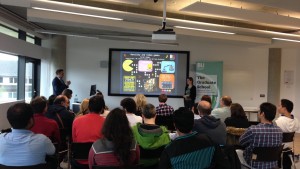 The event was very well attended by students, staff and members of the public, who listened attentively and asked challenging questions after each presentation, engaging in interesting and lively debate about current research taking place at BU and its real-world implications.
The event was very well attended by students, staff and members of the public, who listened attentively and asked challenging questions after each presentation, engaging in interesting and lively debate about current research taking place at BU and its real-world implications.
BURO (your institutional repository): Huge increase in journal article deposits in 2016
There has been a 206% increase in journal article deposits in BURO (via BRIAN) from January-June 2016 compared with the same period last year, 469 deposits compared to 228.
Journal article deposits January – June 2016
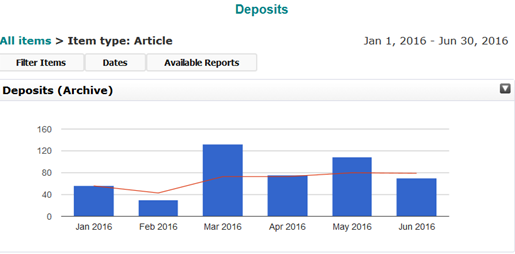
Journal article deposits January – June 2015
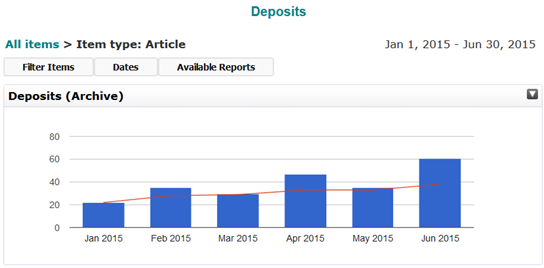
Below is the breakdown by Faculty for January – June 2016:
Faculty of Science & Technology = 176
Faculty of Management = 122
Faculty of Health & Social Sciences = 90
Faculty of Media & Communication = 65
Remember, to be eligible for submission in the next REF, journal articles and conference proceedings (with an ISSN), accepted for publication after 1 April 2016, must be made open access.
In practice, this means the accepted version must be deposited in an institutional repository (BURO via BRIAN) or subject repository within a three-month period from the point of acceptance for publication. This generally means creating a brief manual entry rather than waiting for the data feed.
Do contact the BURO team if you need any help with uploading your publication details or files to BRIAN for BURO and remember our useful guide to open access and depositing your research
We need your help with new research on preventing falls.
Did you know that falls accident is a major health problem increasing its rate worldwide?
Falls accidents among older adults are known to be the third leading cause of chronic disability with an immense impact on the National Health Service causing a cost of more than £2.3 billion per annum.
Indeed only in the UK 30% of people over 65, and 50% of individuals over 80 falls at least once per year.
How can you help?
According to previous findings, the actions that maintain balance in response to destabilising forces acting upon the body can be helped by respiratory muscles.
But we need to understand more about how these muscles can contribute to enhancing human balance, and for this reason, I am now recruiting participant aged 65 or over to take part in a new study that will deepen the role of inspiratory muscle in postural stability.
Do you want to know more?
Do you wish to take part?
If yes send an e-mail to fferraro@bournemouth.ac.uk
Thank you for reading and sharing.
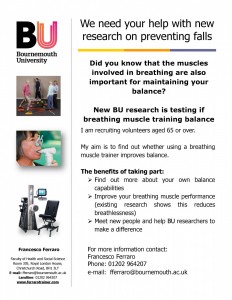
BREXIT Bombshells at BU: WAN’s emergency Open Meeting
 As we know Nigel Farage, the now internationally infamous politician who led the UKIP juggernaut for Brexit is keen to see an ‘Independence Day from the EU’ established in the British calendar once (or if) the button on Article 50 is pushed.
As we know Nigel Farage, the now internationally infamous politician who led the UKIP juggernaut for Brexit is keen to see an ‘Independence Day from the EU’ established in the British calendar once (or if) the button on Article 50 is pushed.
Aptly, if entirely coincidentally, the Women’s Academic Network held an Open To All EGM on the 4th July (Independence Day in the US, as we know) to invite all academic colleagues, female and male, Faculty staff and PGRs, to an emergency meeting to discuss the many serious concerns that have been raised within in our network as well as heard right across BU since the EU Referendum results.
We were pleased to see that despite the short notice invitations were accepted by a number of colleagues from the Faculties, including UCU representatives together with the current SUBU President, Chloe Schendel-Wilson, PGRs, Nathalie Sherring from Dorset Race Equality Council, James Palfreman-Kaye from the BU DDESG – and of course as ever, some of our regular WAN members, who were among the very first at BU to speak out publicly on this hugely challenging issue.
This was an emotionally charged meeting where much anger, anxiety, sorrow and even fear were expressed. We were sobered to hear of the details of racism and xenophobia experienced at BU, as well as beyond the institutional walls. We heard, for example, how MUSE has become a conduit for anonymous abuse where staff have been personally attacked for their accents, identity, and personal appearance, which has been deeply disturbing and demoralising.
Genuine worry was raised by international colleagues about the security of their jobs at BU given Brexit and the political uncertainty relating to EU migrants. Connected to this other concerns voiced were whether this would also affect BU staff progression and pay promotion if the institution regarded EU academics, for example, as consequently less worthy of investing in.
Other comments were that the current, extremely turbulent and worrying political climate will be decidedly off-putting to both international and home students – particularly given the dominance of the Leave vote regionally and neo-fascist views being expressed with apparent impunity.
Among many comments made and ideas offered there was unanimous support for BU to take an immediate lead in sending out much more robust and more visible messages that are clearly supportive of its ethnically, nationally and religiously diverse staff and student body – and making it unambiguously clear that prejudice will be tackled by the University as absolutely unacceptable.
Discussants also felt that it was important for BU to build a coalition of support involving other high profile stakeholders to show that racist and xenophobic persecution will not be tolerated in this region. Such a coalition could and should incorporate the executive body of Bournemouth Council, the Police Commissioner and Dorset Police, MPs such as Conor Burns, Mayoral representatives, local charities, support groups and other prominent institutions and bodies.
To this end, better alignment between BU and SUBU with the European Association of students is needed to show that students from the EU are very welcome here.
Whatever happens next in this extraordinary socio-political time of turmoil and fragmentation, those of us who attended the meeting sincerely hope that BU is seen to remain a European university in a pan-European context by the international community.
So what next? There were many other excellent points raised in the meeting and we have already begun the process of feeding back the outcomes of the meeting to ULT and HR for their consideration and response. However, if you are personally interested in getting involved in some way on this issue feel free to contact us and we may be able to assist or direct you to others who can.
Finally, many thanks to everyone who congratulated WAN on opening this Pandora’s Box of a topic and offered safety, warmth, inclusivity and respect to our participants in WAN and beyond in discussing these dark post-Brexit Blues.
Sara Ashencaen Crabtree & Natasha Tobin
WAN Co-convenors
New CMMPH paper by PhD student Sheetal Sharma
 Today saw the publication in BMC Pregnancy & Childbirth of the paper ‘Dirty and 40 days in the wilderness: Eliciting childbirth and postnatal cultural practices and beliefs in Nepal’ with as lead author FHSS PhD student Sheetal Sharma [1]. This paper argues that pregnancy and childbirth are very much socio-cultural events that carry varying meanings across different societies and cultures. These are often translated into social expectations of what a particular society expects women to do (or not to do) during pregnancy, birth and/or the postnatal period. The study explored beliefs around childbirth in Nepal, a low-income country with a largely Hindu population. The paper then sets these findings in the context of the wider global literature around issues such as periods where women are viewed as polluted (or dirty even) after childbirth.
Today saw the publication in BMC Pregnancy & Childbirth of the paper ‘Dirty and 40 days in the wilderness: Eliciting childbirth and postnatal cultural practices and beliefs in Nepal’ with as lead author FHSS PhD student Sheetal Sharma [1]. This paper argues that pregnancy and childbirth are very much socio-cultural events that carry varying meanings across different societies and cultures. These are often translated into social expectations of what a particular society expects women to do (or not to do) during pregnancy, birth and/or the postnatal period. The study explored beliefs around childbirth in Nepal, a low-income country with a largely Hindu population. The paper then sets these findings in the context of the wider global literature around issues such as periods where women are viewed as polluted (or dirty even) after childbirth.
Sheetal is doing ve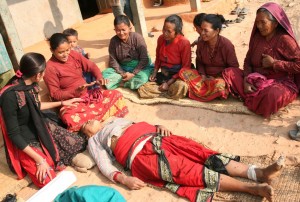 ry well with her PhD publications as a few weeks ago her major quantitative findings paper was published in PLOS One [2]. Both papers are published in Open Access journals and therefore easily available to researchers, health promotors, health care providers and health policy-makers in low-income countries. Sheetal evaluated a research project funded by the London-based charity Green Tara Trust. Her PhD is supervised by Dr. Catherine Angell, Prof. Vanora Hundley and Prof. Edwin van Teijlingen all nbased in CMMPH with external supervision from BU Visiting Faculty Prof. Padam Simkhada (liverpool John Moores University).
ry well with her PhD publications as a few weeks ago her major quantitative findings paper was published in PLOS One [2]. Both papers are published in Open Access journals and therefore easily available to researchers, health promotors, health care providers and health policy-makers in low-income countries. Sheetal evaluated a research project funded by the London-based charity Green Tara Trust. Her PhD is supervised by Dr. Catherine Angell, Prof. Vanora Hundley and Prof. Edwin van Teijlingen all nbased in CMMPH with external supervision from BU Visiting Faculty Prof. Padam Simkhada (liverpool John Moores University).
References:
- Sharma, S., van Teijlingen, E., Hundley, V., Angell, C., Simkhada, P. (2016) Dirty and 40 days in the wilderness: Eliciting childbirth and postnatal cultural practices and beliefs in Nepal BMC Pregnancy & Childbirth 16: 147 https://bmcpregnancychildbirth.biomedcentral.com/articles/10.1186/s12884-016-0938-4
- Sharma, S., van Teijlingen, E., Belizán, J.M., Hundley, V., Simkhada, P., Sicuri, E. (2016) Measuring What Works: An impact evaluation of women’s groups on maternal health uptake in rural Nepal, PLOS One 11(5): e0155144 http://journals.plos.org/plosone/article?id=10.1371%2Fjournal.pone.0155144
BU research: making a difference
On the rainy morning of Saturday 25 June 2016 the Graduate School team, armed with posters, pens and lots of cupcakes, set up a stand at the Festival of Learning. We displayed photographs from the latest PG Conference and Shaqaieq Dost, a current PGR student, was on hand to discuss her research and what it’s like to be a PGR with interested members of the public.
Dr Julia Taylor, Graduate School Academic Manager, talked to several people who had always been interested in PhD study but didn’t know how it would fit in with jobs, family commitments and other such barriers. Suzy Kempinski an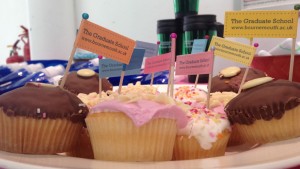 d Louise Bryant, Research Administrators, chatted to current UG and PGT students who were looking at taking the next step in their academic journey into MRes/ PhD study, and about the support that is available within the faculties for PGR students.
d Louise Bryant, Research Administrators, chatted to current UG and PGT students who were looking at taking the next step in their academic journey into MRes/ PhD study, and about the support that is available within the faculties for PGR students.
The cupcakes proved very popular, and we were left with reassurances from several younger members of the crowd that they would be back in 20 years to embark on their PhD at BU!
New Harding and Pritchard paper in international health policy journal
 Andrew Harding and Colin Pritchard have recently had a paper published in the International Journal of Health Policy and Management.
Andrew Harding and Colin Pritchard have recently had a paper published in the International Journal of Health Policy and Management.
The paper, titled ‘UK and Twenty Comparable Countries GDP-Expenditure on-Health 1980 2013: The Historic and Continued Low Priority of UK Health Related Expenditure, uses GDPEH data to outline the low proportional commitment that the UK makes to healthcare expenditure. It is well established in the health and social policy world that the UK prioritises less of its wealth to health than almost any comparable country. However, the authors use an innovative and novel means of exploring proportional differences in commitment.
The key finding is that since 1980, in order to meet the mean average European health spend, the UK would have needed to have made an additional commitment of one-fifth. For the final period, between 2010-2013 the authors show that the UK has prioritised 12% less in proportional terms (as a % of GDP) than the European average.
The paper ends with the following quote, “Echoing others who have recently contributed to discussion in this area, if other comparable countries can make a larger proportional commitment and deem it affordable, in light of aforementioned challenges, why cannot the United Kingdom prioritise accordingly?”
BU academics launch EU Referendum Analysis report within ten days of the vote
Featuring 80 contributions from 100 leading UK academics, this publication captures the immediate thoughts, reflections and early research insights on the 2016 Referendum on UK Membership of the European Union from the cutting edge of media and politics research.
Published 10 days after the election, these contributions are short and accessible. Authors provide authoritative analysis of the campaign, including research findings or new theoretical insights; to bring readers original ways of understanding the referendum and its consequences. Contributions also bring a rich range of disciplinary influences, from political science to fan studies, journalism studies to advertising.
The publication is available as a downloadable PDF, as a website and as a printed report.
We are hosting an invitation only launch event at the House of Commons (18 July) and an open event on Brexit in Leicester (IAMCR pre-conference, 27 July).
You can register for the conference here:
https://www.eventbrite.co.uk/e/the-brexit-campaign-2016-uk-referendum-on-membership-of-european-union-tickets-24771805136
EU Referendum Analysis website:
http://www.referendumanalysis.eu
Direct PDF download:
http://bit.ly/EUReferendumAnalysis2016_Jackson-Thorsen-and-Wring_v1
Thanks to all of our contributors and production staff who helped make the quick turnaround possible. We hope it makes for a vibrant and engaging read!
TABLE OF CONTENTS
Introduction: the Brexit campaign (Daniel Jackson, Einar Thorsen and Dominic Wring)
Section 1: Context
1. EEC/EU campaigning in long-term perspective (Jay Blumler)
2. From Super-Market to Orwellian Super-State: the origins and growth of newspaper scepticism (Dominic Wring)
3. Understanding the role of the mass media in the EU Referendum (Mike Berry)
4. Brexit: the destruction of a collective good (Chris Gifford)
5. How the Brexit outcome has changed our understanding of referendums (John Fitzgibbon)
6. The referendum and Britain’s broken immigration politics (Andrew Geddes)
7. The great miscalculation: David Cameron’s renegotiation and the EU Referendum campaign (Andrew Glencross)
Section 2: Politics
8. Rhetoric of excess (James Martin)
9. Myth versus fact: are we living in a post-factual democracy?(Susan Banducci and Dan Stevens)
10. Destroying and building democracy, a German view(Catherine Goetze)
11. Remembrance of Referendums Past: Scotland in the campaign (Michael Higgins)
12. Public personalities in the EU debate: Elites vs. the majority and Bullingdon resurgent(Nathan Farrell)
13. Healthier ever after? The NHS as a campaign issue (Tamara Hervey)
14. Wales, immigration, news media and Brexit (Kerry Moore)
15. The referendum campaign and the public’s constitutional understanding (David Yuratich)
16. The EU referendum and the Country of Origin principle (COO) (Irini Katsirea)
17. Calming the storm: fighting falsehoods, fig leaves and fairy tales (Alan Renwick, Matthew Flinders and Will Jennings)
Section 3: News
18. The press and the Referendum campaign (David Levy, Billur Aslan and Diego Bironzo)
19. The narrow agenda: how the news media covered the Referendum (David Deacon, John Downey, Emily Harmer, James Stanyer and Dominic Wring)
20. Newspapers’ editorial opinions during the referendum campaign (Julie Firmstone)
21. Brexit ‘mansplained’: news coverage of the EU Referendum (Emily Harmer)
22. Scrutinising statistical claims and constructing balance: television news coverage of the 2016 EU Referendum (Stephen Cushion and Justin Lewis)
23. Regulated equivocation: the referendum on radio (Guy Starkey)
24. Referendum night goings on (Stephen Coleman)
25. The view from across the pond: Brexit on American media (Filippo Trevisan)
26. A victory of the nation state: the EU Referendum in the Southern European press (Iñaki Garcia-Blanco)
Section 4: Journalism
27. How our mainstream media failed democracy (Steven Barnett)
28. Divided Britain? We were already divided… (Des Freedman)
29. Deliberation, distortion and dystopia: the news media and the referendum (Charlie Beckett)
30. UK newspapers and the EU Referendum: Brexit or Bremain?(Oliver Daddow)
31. X marks the spot but the Ys have it: Referendum coverage as a boys’ own story (Karen Ross)
32. Mind the gap: the language of prejudice and the press omissions that led a people to the precipice (Paul Rowinski)
33. ‘They don’t understand us’: UK journalists’ challenges of reporting the EU (Anna Wambach)
34. Bending over backwards: the BBC and the Brexit campaign (Ivor Gaber)
35. Bums gone to Iceland: England, Brexit and Euro 2016 (Roger Domeneghetti)
36. It’s the ‘primary definers’, stupid! (Chris Roberts)
37. Brexit: inequality, the media and the democratic deficit (Natalie Fenton)
Section 5: Campaign and Political Communication
38. Why facts did matter in the campaign (Christoph Meyer)
39. Less a soap opera, more a fantasy drama? (John Street)
40. The rhetoric of the EU Referendum campaign (Andrew S. Crines)
41. A (very) brief period of Habermasian bliss (Mick Temple)
42. The toxicity of discourse: reflections on UK political culture following the EU Referendum (Katy Parry)
43. Britishness and Brexit (Frances Smith)
44. Neither tackling lies nor making the case: the Remain side (Kirsty Hughes)
45. Break-point for Brexit? How UKIP’s image of ‘hate’ set race discourse reeling back decades (James Morrison)
46. Referendum campaign broadcasts on television: A generational clash? (Vincent Campbell)
47. Interaction and ‘the floor’ in the televised debates of the EU referendum campaign(Sylvia Shaw)
48. Comedy clubs offered a better quality of debate than the political stage (Sophie Quirk)
49. ‘Project Art’ versus ‘Project Fear’: the art establishment against Brexit (Matt Hills)
50. Notes for editors: what the campaign press releases tell us about Vote Leave and Britain (Paula Keaveney)
Section 6: Parties
51. The triumph and tribulations of Conservative Euroscepticism(Philip Lynch)
52. Celebrity politicians and populist media narratives: the case of Boris Johnson (Mark Wheeler)
53. ‘Tuck your shirt in!’ It’s going to be a bumpy ride: Boris Johnson’s swerve to Brexit (Candida Yates)
54. ‘Conservative party future?’ Party disunity, the media and the EU Referendum (Anthony Ridge-Newman)
55. Cameron and the Europe question: Could it have ended any other way? (Tristan Martin)
56. The Liberal Democrats: the EU Referendum’s invisible party (Andrew Russell)
57. The Durham miners’ role in Labour’s culture wars (Eunice Goes)
58. The immigration debate: Labour versus Leave in the battle to win public trust (Thom Brooks)
59. The age of Nigel: Farage, the media, and Brexit (Neil Ewen)
Section 7: Social Media
60. Leave versus Remain: the digital battle (Andrew Mullen)
61. The results are in and the UK will #Brexit: What did social media tell us about the UK’s EU referendum? (Clare Llewellyn and Laura Cram)
62. Automatic polling using Computational Linguistics: more reliable than traditional polling? (Massimo Poesio, John Bartle, Jacqueline Bechet, Fabio Celli, Carmelo Ferrante, Marc Poch, Hugo Zaragoza and Giuseppe Riccardi)
63. Impact of social media on the outcome of the EU referendum (Vyacheslav Polonski)
64. Talking past each other: the Twitter campaigns (Simon Usherwood and Katharine Wright)
65. Political memes and polemical discourse: the rise of #usepens (Mary Mitchell)
66. E-newsletters, persuasion and the referendum (Nigel Jackson)
67. United by what divides us: 38 Degrees and the EU Referendum (James Dennis)
68. Boris, Brexit or bust (Alec Charles)
Section 8: Voters
69. What explains the failure of ‘Project Fear’? (Jane Green)
70. Workers rights in the EU and out: social class and the trade unions’ contribution to the debate (Jen Birks)
71. ‘I want my country back’: Emotion and Englishness at the Brexit ballotbox (Russell Foster)
72. Mixed feelings: how citizens expressed their attitudes towards the EU (Darren G. Lilleker)
73. ‘We want our country back’ – stop sneering, start listening (Michael Skey)
74. Young people in a changing Europe: British youth and Brexit 2016 (Matt Henn and Darren Sharpe)
75. Bonfires and Brexterity: what’s next for women? (Charlotte O’Brien)
76. The ‘Referendum Bubble’: what can we learn from EU campaign polling? (Louise Thompson)
77. Did the EU Referendum boost youth engagement with politics? (Stuart Fox and Sioned Pearce)
78. Campaign frames in the Brexit referendum (Sofia Vasilopoulou)
79. The emotional politics of the EU Referendum: Bregrexit and beyond (Karin Wahl-Jorgensen)
New paper FHSS Dr. Sarah Collard
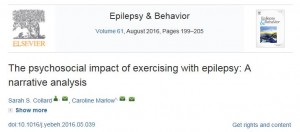 Congratulations to Dr. Sarah Collard on her latest paper ‘The psychosocial impact of exercising with epilepsy: A narrative analysis’ in Epilepsy & Behavior. The paper offers valuable insight into the psychosocial benefits of and barriers to exercising with epilepsy and draw attention to the individual differences in how a person with epilepsy copes with uncontrolled seizures and their impact on his/her exercise routine. This knowledge can lead to future research in exploring how a person with epilepsy can overcome these barriers to exercise and encourage more people with epilepsy to enjoy the benefits of exercise.
Congratulations to Dr. Sarah Collard on her latest paper ‘The psychosocial impact of exercising with epilepsy: A narrative analysis’ in Epilepsy & Behavior. The paper offers valuable insight into the psychosocial benefits of and barriers to exercising with epilepsy and draw attention to the individual differences in how a person with epilepsy copes with uncontrolled seizures and their impact on his/her exercise routine. This knowledge can lead to future research in exploring how a person with epilepsy can overcome these barriers to exercise and encourage more people with epilepsy to enjoy the benefits of exercise.
Congratulations!
Prof. Edwin van Teijlingen
CMMPH
Painting a picture of retirement at the Festival of Learning
What image comes to mind when you think about your pension and retirement? Our session at the Festival of Learning, painting a picture of retirement, sought to answer this very question.
The session builds on current research funded by the Academy of Marketing into how people from South Asian view their pension savings as a money source; what informed their perceptions; and how they intend to use this money. This research used a ‘talk and draw’ approach whereby interviewees were asked to draw a picture to represent their pension/retirement and then to talk through what the images represent to them.
At the Festival of learning event attendees were also asked to draw their own picture of their pension and retirement. As a group we discussed the images that emerged and then compared and contrasted them to the images collected and themes that emerged from our earlier research.
The findings from our research will be presented at the Academy of Marketing Conference at Newcastle Business School next week. In the meantime we would like to thank all those who attended our session and shared their personal images of their pension and retirement on the day.
If you would like to know more about this research please contact Julie Robson or Samreen Ashraf.
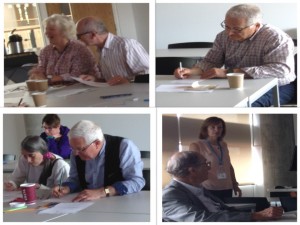
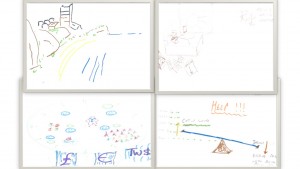
BU’s LEAP staff & SERT placement students featured in local Indonesian news regarding human elephant conflict in Northern Sumatra
In June, Dr Amanda Korstjens, 10 UG and 1 PGT student together with MRes student Emma Hankinson and PhD student Chris Marsh from the Life and Environmental Sciences and the Archaeology, Anthropology and Forensic Sciences Departments took part in a field trip to Indonesia run by Dr. Amanda Korstjens to investigate human wildlife conflict and ecotourism in Indonesia. The placements fall within the SERT scheme and the research forms part of LEAP: Landscape Ecology and Primatology http://go-leap.wix.com/home.
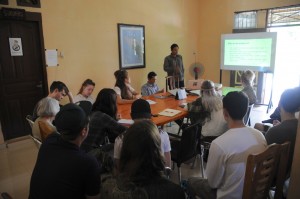
One of our activities involved a visit to Langsa. In Langsa, in the Aceh province of northern Sumatra, the group met up with Rudi Putra of HAkA and FKL (Forest, Nature, Enviroment of Aceh & Leuser Conservation Forum) and winner of the 2014 Goldman Environmental Prize http://www.goldmanprize.org/recipient/rudi-putra to discuss the problems faced in preserving the Leuser ecosystem and wildlife in Indonesia.
The group of staff and students first visited the CRU Conservation response unit in Serbajadi Aceh Timur where they met with Tezar Pahlevie, the regional manager of HAkA and FKL, Dedek Makam, the CRU coordinator of the region, and Ilham Fonna, Wildlife Protection Team supervisor for FKL to learn about the problems the wild elephants are facing, including human wildlife conflict, poaching and deforestation. The group were able to meet the captive elephants that are used in protecting and patrolling against poaching and other illegal activities in the area and to chase away marauding wild elephants from plantations.
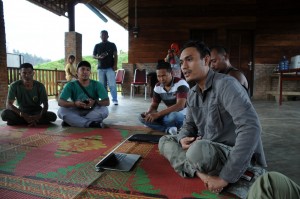
Staff and students then visited a local palm-oil plantation with Tezar Pahlevie to investigate the undergoing human elephant conflict and regular destruction of palm oil plantations in the area. Whilst travelling to the plantation, local journalists, Said Moulana SH from TVRI and Luth Pi from Net TV joined the university group and began filming the events of the day for local Indonesian news https://www.youtube.com/watch?v=5WoaPLDs43g and news articles were also published regarding the events of the day http://pelita8.com/mahasiswa-inggris-kunjungi-kawasan-yang-di-rusak-gajahliar-di-aceh-timur (more can be found below). Once at the plantation, the group explored the impacts that wild elephants are having on surrounding local businesses and communities, including an interview with the plantation manager, Usman Hanapiah and visits to the areas most badly affected by the wild elephants. All of the students were involved in the interview and explored the impacts, attempted resolves and the potential future solutions regarding the human elephant conflict, and the overall future of the plantation and the wild elephants.
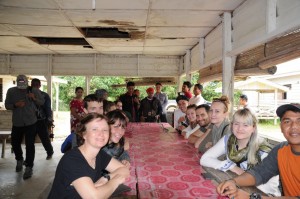
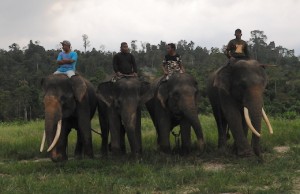
Many students received funds for the trip from the Departmental International Travel Grant, Global Horizons, or the Project & Placement fund of the Alumni. The Life and Environmental Sciences Department International Travel Grant funded Dr Korstjens’s expenses and those for co-leader Emma Hankinson (MRes student) and Chris Marsh (PhD student), who are currently conducting their field research in Indonesia. The work forms part of LEAP’s elephant project: http://go-leap.wix.com/home#!elephants/c578 which is funded by the International Elephant Foundation M. Phil Kahl fellowship (2016) and Rufford Small Grants (2016) and People’s Trust for Endangered Species (PTES, 2016)
Written by Nicola Collins who is supporting LEAP as a BU-funded Undergraduate Research Assistant Placement student.
For more information visit:
LEAP: Landscape ecology and Primatology: http://go-leap.wix.com/home
HAkAR: http://www.haka.or.id
FKL: https://www.facebook.com/Forum-Konservasi-Leuser-FKL-219705561560977/
More Indonesian news articles published regarding the palm oil plantation visit:
http://www.kanalaceh.com/2016/06/19/mahasiswa-inggris-teliti-konflikgajah-manusia-di-aceh-timur/
http://www.acehtraffic.com/2016/01/aceh-timur-miliki-cru-serbajadi.html
Fair Access Research publication: Troubling ideas
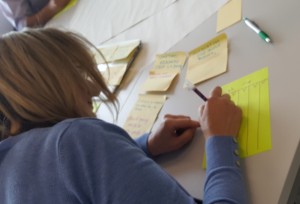
Bournemouth University is undertaking a large collaborative research study exploring issues of access to higher education. We are pleased to announce that members of the Fair Access Research project from BU and the University of Liverpool have had an article published in the influential Journal of Widening Participation and Lifelong Learning.
We explored how universities and colleges use research as part of their plans to widen participation and open up higher education to people from disadvantaged backgrounds. They found that while national policy is leading to more institutions mentioning research as part of their Access Agreements; it tends to be in the context of justifying spending rather than leading to significant behaviour change.
The most recent strategic guidance from the Office for Fair Access emphasised the importance of building a community of practice across institutions, with practitioners and academics working and learning together to understand effective practice and the impact of interventions.
It is hoped that when the 2017-18 access agreements are published over the coming months we see a sector engaging much more with research in order to transform thinking, practice and the sector as a whole.
For more information of this paper email Alex Wardrop (awardrop@bournemouth.ac.uk). For more information about the Fair Access Research project email Vanessa Heaslip (vheaslip@bournemouth.ac.uk) and Clive Hunt (chunt@bournemouth.ac.uk)
NERC/AHRC/ESRC GCRF Building Resilience call
![]() As part of the Global Challenges Research Fund (GCRF), the UK research councils, led by NERC, the Arts and Humanities Research Council (AHRC) and the Economic and Social Research Council (ESRC), are taking a leadership role in generating inter-disciplinary research and communities which can address the issue of ‘Building Resilience’.
As part of the Global Challenges Research Fund (GCRF), the UK research councils, led by NERC, the Arts and Humanities Research Council (AHRC) and the Economic and Social Research Council (ESRC), are taking a leadership role in generating inter-disciplinary research and communities which can address the issue of ‘Building Resilience’.
![]() Building resilience rests on the ability to take a holistic approach which encompasses environmental knowledge, socio-economics, infrastructure, governance, and the history and culture of a community or region that is affected. It will require new inter-disciplinary research and recognition of the importance of engaging with local actors to understand what knowledge is required and how it can be implemented to design solutions that help all parts of society.
Building resilience rests on the ability to take a holistic approach which encompasses environmental knowledge, socio-economics, infrastructure, governance, and the history and culture of a community or region that is affected. It will require new inter-disciplinary research and recognition of the importance of engaging with local actors to understand what knowledge is required and how it can be implemented to design solutions that help all parts of society.
 The call is open to proposals addressing resilience to natural and man-made environmental hazards in a range of developing world contexts. The focus is on how to build resilience in relation to both sudden and slow-onset environmental hazards (eg land-degradation, deforestation, drought, hurricanes, climate change) taking into account the intersections and relationships with other contexts such as conflict and fragility, poverty and famine, urbanisation, economics and health / disease risks.
The call is open to proposals addressing resilience to natural and man-made environmental hazards in a range of developing world contexts. The focus is on how to build resilience in relation to both sudden and slow-onset environmental hazards (eg land-degradation, deforestation, drought, hurricanes, climate change) taking into account the intersections and relationships with other contexts such as conflict and fragility, poverty and famine, urbanisation, economics and health / disease risks.
The call will fund foundation-building activities to stimulate the creation of inter-disciplinary international research communities; to enable broader, deeper and more effective collaborations with beneficiaries and user organisations at the forefront of the development agenda; test new innovative ideas and inter-disciplinary approaches for addressing the issue of developing resilience. All proposals are expected to take an inter-disciplinary approach, bringing together environmental science with social science and arts and humanities.
A total of £3.3 million of funding is available for this call. Awards are expected to vary in scale according to the nature of the activities proposed and not to exceed £200,000 (at 100 per cent full economic costs). The funders anticipate funding 15-20 projects ranging from 3-9 months. A small number of projects of 12 months duration can be funded. Successful projects will be expected to start no later than 1 November 2016.
The closing date for applications is 16.00 on 6 September 2016.
 Workshop
Workshop
There will be a workshop on 19 July 2016 to provide more information on the call and facilitate the development of collaborations between academics from different disciplines and between academics, beneficiaries and users. To apply to attend please complete the online application form by 27 June 2016.
Further information
Further details about the call and workshop can be found on the NERC website. If you are interested in applying to this call then please contact the RKEO Funding Development Team in the first instance.
Reminder – Development Opportunity – Engaging with a Business Audience
Development Event Reminder
The Knowledge Exchange and Impact Team along with the Service Excellence Team have put together a one-day development event for academic colleagues who wish to engage with organisations.
This activity takes place daily across the Institution, however if you are interested in learning about how to engage and communicate with a business audience including developing relationships and networking, this one-day development event will help you.
Lunch is included with refreshments throughout the day.
Venue: Marriott Hotel, Bournemouth
Date: Tuesday 19th July
Time: 9am-4.30pm
For further information and to book your place, please contact Rachel Clarke, Knowledge Exchange Adviser (KTP and Student Projects) on 61347 or email clarker@bournemouth.ac.uk
Would you like to test the new research council grants system?
 The research councils are replacing their electronic grants submission service, Je-S, in 2017. More information about this project can be found here http://www.rcuk.ac.uk/funding/2017update/
The research councils are replacing their electronic grants submission service, Je-S, in 2017. More information about this project can be found here http://www.rcuk.ac.uk/funding/2017update/
They are looking for more people to get involved in user research. Can you help?
Initially they are looking for researchers; they need to test with both people who have never applied for a research grant through the Je-S system before as well as those who are more frequent applicants. At this stage they will predominantly be testing prototypes with users. User testing will be carried out throughout the year in a number of formats, such as site visits, remotely over Skype, or through labs where users go to a central location nearby.
Test sessions will take between half an hour to an hour. If you are interested in being a tester then please can you let me, Jo Garrad, know by 15th July 2016. You will need to provide me with the following information:
- Name
- Organisation
- Academic Discipline (high level)
- Email address and telephone number
- Have you got experience of applying for grants? yes/no
- Are you likely to apply for grants in the future but haven’t done so to date? yes/no
- Do you work in a research development, finance or other research office role? yes/no
- Have you conducted peer reviews for the Research Councils or any other funder before? yes/no
- Have you sat on an assessment or moderating panel for the Research Councils or any funder before? yes/no











 BU Leads AI-Driven Work Package in EU Horizon SUSHEAS Project
BU Leads AI-Driven Work Package in EU Horizon SUSHEAS Project Evidence Synthesis Centre open at Kathmandu University
Evidence Synthesis Centre open at Kathmandu University Expand Your Impact: Collaboration and Networking Workshops for Researchers
Expand Your Impact: Collaboration and Networking Workshops for Researchers Visiting Prof. Sujan Marahatta presenting at BU
Visiting Prof. Sujan Marahatta presenting at BU 3C Event: Research Culture, Community & Can you Guess Who? Thursday 26 March 1-2pm
3C Event: Research Culture, Community & Can you Guess Who? Thursday 26 March 1-2pm ECR Funding Open Call: Research Culture & Community Grant – Apply now
ECR Funding Open Call: Research Culture & Community Grant – Apply now ECR Funding Open Call: Research Culture & Community Grant – Application Deadline Friday 12 December
ECR Funding Open Call: Research Culture & Community Grant – Application Deadline Friday 12 December MSCA Postdoctoral Fellowships 2025 Call
MSCA Postdoctoral Fellowships 2025 Call ERC Advanced Grant 2025 Webinar
ERC Advanced Grant 2025 Webinar Update on UKRO services
Update on UKRO services European research project exploring use of ‘virtual twins’ to better manage metabolic associated fatty liver disease
European research project exploring use of ‘virtual twins’ to better manage metabolic associated fatty liver disease